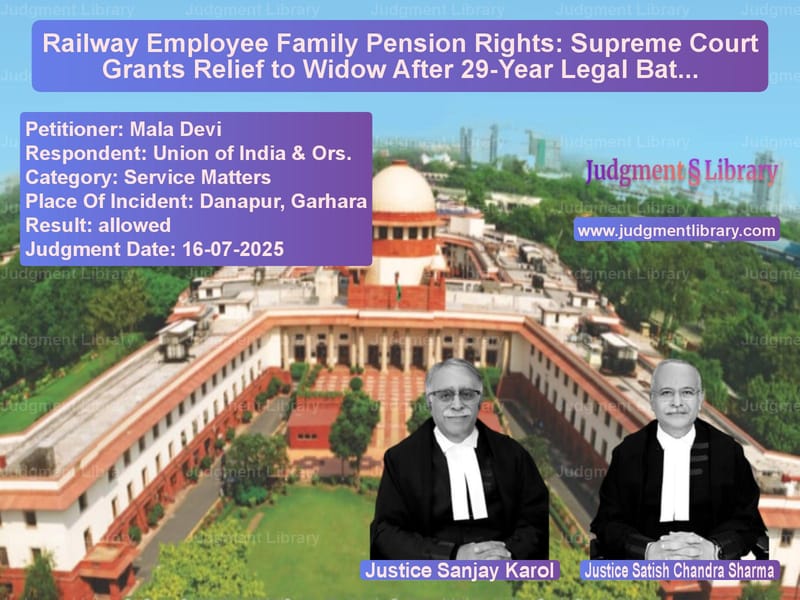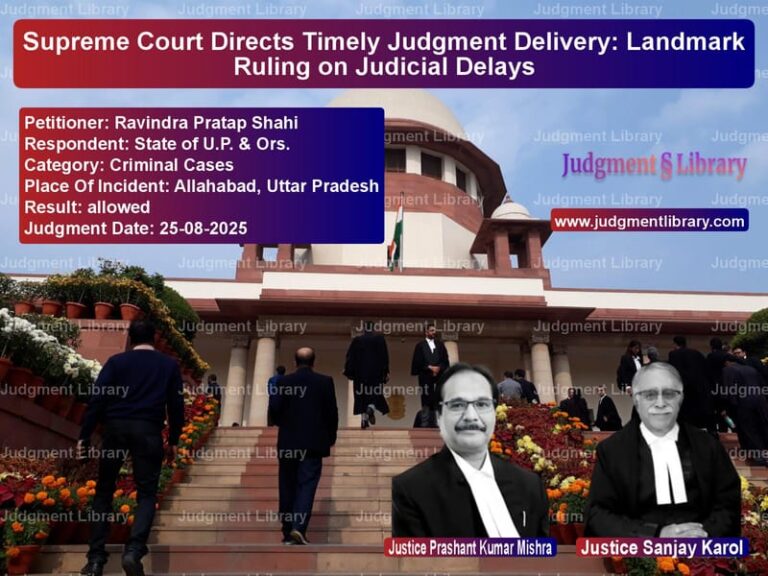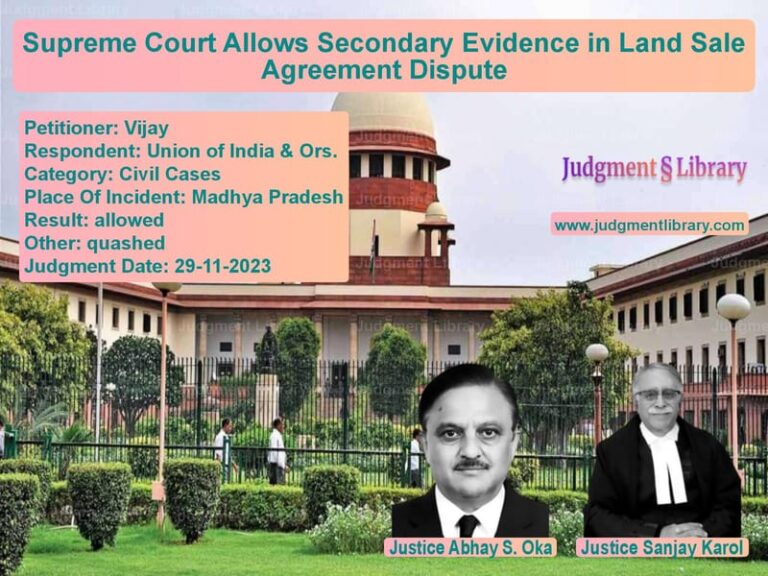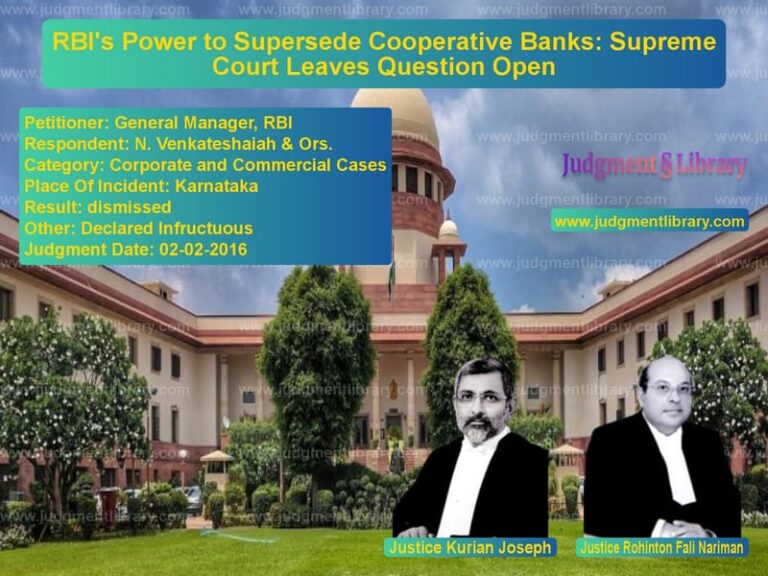Railway Employee Family Pension Rights: Supreme Court Grants Relief to Widow After 29-Year Legal Battle
In a landmark judgment that brings relief to thousands of temporary government employees, the Supreme Court has ruled that family pension cannot be denied to the widow of a railway employee who died while in service, even if his employment was not regularized. The case of Mala Devi, who fought for nearly three decades to secure her rightful family pension after her husband’s tragic death while on duty, has set an important precedent for the rights of temporary employees across India.
The heartbreaking story begins in 1986 when Om Prakash Maharaj joined the Eastern Indian Railways as a Summer Waterman. He worked diligently for nearly a decade, progressing through various positions including Substitute Porter and eventually being deputed as a Guard/Shuntman. Tragically, on July 10, 1996, he met with a fatal accident while performing his duties, leaving behind his wife Mala Devi. He had served continuously for 9 years, 8 months and 26 days – just three months short of completing ten years of service.
The railway authorities denied Mala Devi family pension, arguing that since her husband’s services had not been regularized and he hadn’t completed ten years of service, she wasn’t entitled to pension benefits. She received only an ex-gratia payment and was eventually given a compassionate appointment as a Substitute Gangman, which was regularized after 120 days. But the fight for her husband’s family pension would become a 29-year legal battle that would reach the highest court of the land.
Mala Devi first approached the Central Administrative Tribunal in 2014, seeking family pension from the date of her husband’s death with all consequential benefits along with interest at 18% per annum. The Tribunal dismissed her application, holding that “the screening will not confer any right to pension” and that in the absence of regularization documents, she wasn’t entitled to family pension.
When she approached the Patna High Court, it too dismissed her petition, relying on the case of Uttar Haryana Bijli Vitran Nigam Ltd. & Ors. v. Surji Devi, observing that family pension is not admissible to the wife of an employee whose services were not regularized. The High Court also noted that since her husband had served for 9 years 8 months and 26 days, it fell short of 10 years, which they considered the minimum qualifying service for grant of family pension.
Before the Supreme Court, the appellant’s counsel argued that Rule 1515 of the Indian Railway Establishment Manual confers upon substitutes certain rights and privileges as may be admissible to temporary railway servants upon completion of four months of continuous service. They also relied on Rule 18(3) of Railway Service (Pension) Rules, 1993 which extends benefit of family pension and death gratuity in the event of death in harness of a temporary railway servant on the same scale as a temporary railway servant.
The appellant’s legal team emphasized that “Substitutes should be afforded all the rights and privileges as may be admissible to temporary railway servants, from time to time on completion of four months continuous service” as per Rule 1515 of the Indian Railway Establishment Manual. They also pointed to Rule 75(2)(a) of the Pension Rules, 1993 which confers family pension “where a railway servant dies after completion of one year of continuous service.”
The Railways, however, maintained their position that the deceased had not completed 10 years in service which they claimed was the minimum qualifying service for grant of family pension. They argued that since he was not regularized, the question of grant of family pension did not arise. The counsel for respondents also contended that the argument regarding Rule 1515 of the Railway Establishment Manual and the Railway Pension Rules, 1993 was not made by the appellant before the courts below and could not be raised at this stage.
The Supreme Court bench comprising Justice Sanjay Karol and Justice Satish Chandra Sharma delivered a powerful judgment that prioritized substantive justice over technicalities. The court referred to the case of Prabhavati Devi v. Union of India & Ors. where the court had extended the relief of family pension to the widow of a deceased railway servant who had died in harness.
The court made several crucial observations that redefine the rights of temporary employees. Justice Sharma, writing the judgment, noted that “After one year of continuous service, clearing his medical examination and screening, and upon being subsequently deputed on a different post, on the instructions of Dy. CYM, Garhara, he acquired the status of a temporary railway servant for the purposes of the Railway Service (Pension) Rules, 1993 and hence became entitled to the benefit of family pension, as any other temporary railway servant.”
The court specifically addressed the one-year versus ten-year service requirement controversy, stating that “Rule 75 of Railway Pension Rules, 1993, makes it further clear that the qualifying service for a temporary railway servant to be entitled for the grant of benefit of family pension is a continuous service of one year.” The judgment emphasized that “this benefit of family pension is accrued to the family of the deceased railway servant who died in harness after completion of one year of continuous service, without any discrimination, whether the post was temporary or had been regularized.”
The court strongly criticized the railway administration’s approach in denying pension benefits for falling short by just three months, observing that “the argument canvassed by the Respondents in depriving the Appellant of family pension from her deceased husband for not completing 10 years of qualifying service by falling short of hardly 3 months, is not in congruence with the legislative intent of the Indian Railway Establishment Manual & the Railway Pension Rules, 1993.”
The judgment highlighted the salutary purpose of pension rules, noting that “The salutary purpose of the rules thereunder is to extend the benefit of family pension to the families of those servants who have served for a considerable strength of time.” The court also pointed out that this was not a case of a casual laborer being simply accorded temporary status without scrutiny, but that the deceased had reached the necessary stage of scrutiny/screening for regularization and had been carrying out his services “literally till his last breath.”
In a significant move, the Supreme Court exercised its extraordinary powers under Article 142 of the Constitution to do complete justice, awarding an ex-gratia amount of Rs. 5,00,000 to Mala Devi in recognition of her prolonged legal battle and the hardship she endured. The court noted “the plight of the Appellant who has been pursuing the litigation seeking family pension since 2014, and the salient purpose of a family pension to serve dependents tide over the crisis.”
The court allowed the appeal and set aside the orders of the High Court and Central Administrative Tribunal. The Railways were directed to calculate the arrears of family pension and pay both the arrears and regular family pension to Mala Devi within four months. The family pension will be governed as per Rule 75 read with Rule 18(3) of Railway Service (Pension) Rules, 1993 which extends benefit of family pension and death gratuity to temporary railway servants on the same scale as permanent employees.
This judgment represents a significant victory for the rights of temporary government employees and their families. It establishes that technicalities like regularization cannot be used to deny fundamental social security benefits to employees who have served the organization for substantial periods. The court’s recognition that the purpose of family pension is to help dependents tide over crises reinforces the social welfare objective of pension schemes.
The ruling also serves as an important reminder to government departments and public sector undertakings that their responsibility towards employees extends beyond technical employment classifications to substantive justice and welfare. By considering the nearly ten years of continuous service as sufficient for pension eligibility, the court has prevented the injustice of denying benefits over a minor shortfall of three months.
For thousands of temporary employees across India, particularly in the railway sector which employs a significant number of temporary workers, this judgment provides much-needed clarity and protection. It ensures that years of dedicated service cannot be rendered meaningless by technical interpretations of rules, and that families who lose their breadwinners while in service will receive the support they are entitled to, regardless of the employee’s regularization status.
Petitioner Name: Mala Devi.Respondent Name: Union of India & Ors..Judgment By: Justice Sanjay Karol, Justice Satish Chandra Sharma.Place Of Incident: Danapur, Garhara.Judgment Date: 16-07-2025.Result: allowed.
Don’t miss out on the full details! Download the complete judgment in PDF format below and gain valuable insights instantly!
Download Judgment: mala-devi-vs-union-of-india-&-ors-supreme-court-of-india-judgment-dated-16-07-2025.pdf
Directly Download Judgment: Directly download this Judgment
See all petitions in Pension and Gratuity
See all petitions in Employment Disputes
See all petitions in Public Sector Employees
See all petitions in Contractual Employment
See all petitions in Other Cases
See all petitions in Judgment by Sanjay Karol
See all petitions in Judgment by Satish Chandra Sharma
See all petitions in allowed
See all petitions in supreme court of India judgments July 2025
See all petitions in 2025 judgments
See all posts in Service Matters Category
See all allowed petitions in Service Matters Category
See all Dismissed petitions in Service Matters Category
See all partially allowed petitions in Service Matters Category







